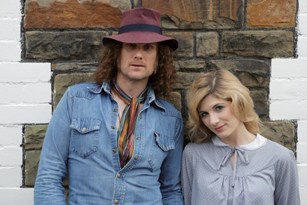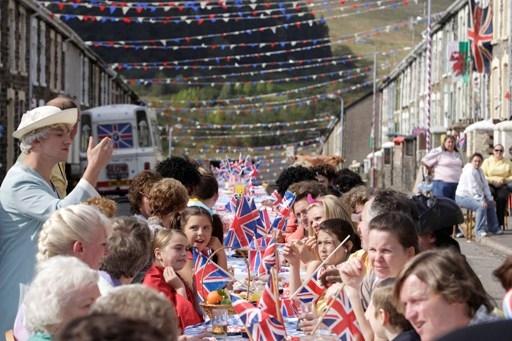Where were you? For those of us too young to experience Kennedy’s assassination, which realistically is anyone under the age of 55, the Royal Wedding is the next event along the chain of history that simultaneously impinged on much of the globe’s consciousness. In July 1981, I was on a French course in Clermont Ferrand and the whole group watched Lady Di get Prince Charles’s names in the wrong order on a TV in class. There must have been French commentary. Were you anywhere in particular?
For the inhabitants of a Welsh pit village in Abi Morgan’s drama Royal Wedding, the nuptials up in London brought them out into the street to eat, drink, dance and, for the ladies, take part in a Lady Di lookalike competition. The terraced houses sprouted with variations on Diana’s elegant blonde crash-helmet do, from teenagers to pensioners. For the villagers caught in the grip of failing marriages and economic recession, it was meant to be a day to forget about suppressed longing and nobly borne disappointment and celebrate their place in the fabric of the nation.
Instead, this being drama, the discontent bubbled up nicely to the surface. Jodie Whittaker played Linda, just laid off from the local garment factory. The twist was that her boss had singled her out for a redundancy payment in the hope that she’d use her cheque to elope with him. His wife was a childless Thatcherite shrew with a fake-tan obsession, her husband Johnny (Darren Boyd, pictured below with Whittaker) a dope-whacked dreamer nursing hopes of discovery as a singer-songwriter trading as The John. But Linda had Tammy, her 15-year-old daughter to think of, now the same age as she was when she fell accidentally pregnant. Until events put her right, Tammy (beautifully caught by Gwyneth Keyworth) nursed the fantasy that she was the product of true love, like the fairytale wedding being beamed into their homes along with all those posh English accents.
 Much of Royal Wedding was more or less perfect, beginning with the retro BBC Two logo on your screen before the drama itself began. It felt like the early 1980s, with Adam and the Ants on the radio and Polaroids delivering instant snaps. The Seventies were not long gone from these parts. One bloke in the fancy dress competition was mistaken for a Bay City Roller. “You’ve got way too much Kiki Dee,” said a Cure fan to Tammy when rifling through her cassettes.
Much of Royal Wedding was more or less perfect, beginning with the retro BBC Two logo on your screen before the drama itself began. It felt like the early 1980s, with Adam and the Ants on the radio and Polaroids delivering instant snaps. The Seventies were not long gone from these parts. One bloke in the fancy dress competition was mistaken for a Bay City Roller. “You’ve got way too much Kiki Dee,” said a Cure fan to Tammy when rifling through her cassettes.
The bigger picture was less easy to read. Much of it felt like a switchback ride between carefully nuanced family drama and broad-brushstroke farce, without ever quite deciding how seriously it wanted you to take it. On the one hand, as every character’s dissatisfaction was addressed and eventually dealt with, the idea proposed was that contrary to events being played out up in London, life isn’t a fairytale, there is no escape from the humdrum, and the trick is to find contentment within its parameters.
“There is no Prince Charming,” concluded Linda in her speech to the whole village, having decided not to run away with the weak-willed local Tory after all. “There is no happy ever after.” All very affecting. And yet when it suited, the script didn’t mind going along with the fantasy. Having come to understand that he’d lost Linda, Johnny leapt up onto the DJ’s truck and crooned out “Endless Love”, only for an evidently moved Linda to march through the parting crowd and join him on harmonies. “It’s only a song,” she said when he took this for a sign of instant reconciliation, at which point he threw himself off a ledge, only to do no more than hurt his leg. Fantasy, farce, drama, comedy: all this in about 45 seconds of screen time. It felt disingenuous. The lightly trowelled irony of Royal Wedding, of course, is that so were the vows of Wales's Prince.















Add comment